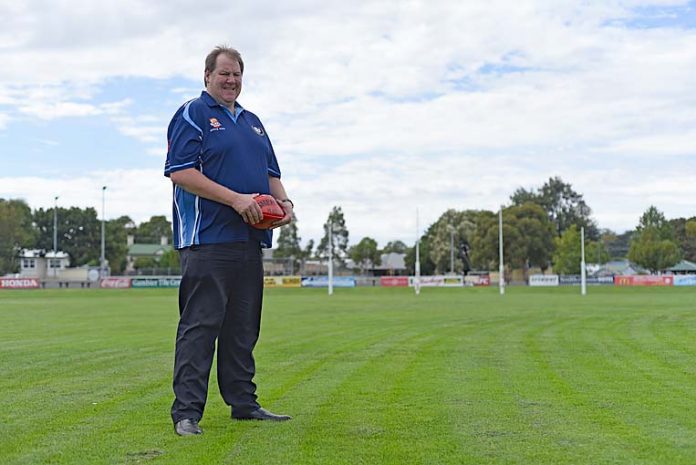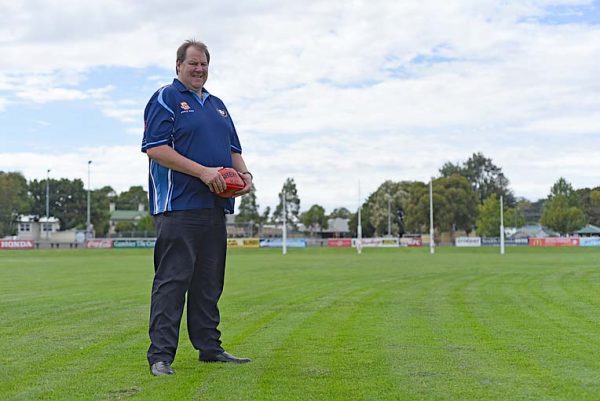

FOOTBALLERS in the Limestone Coast waited with anticipation for the COVID-19 updates from South Australian Premier Steven Marshall on the weekend, but there is still no clear pathway to a season ahead.
According to stage two restrictions non-contact training can begin on Monday, May 18, with three groups of 10 allowed on any oval, sticking to additional protocols provided by the SANFL body.
The list of additional protocols is extensive, under the Australian Institute of Sport’s framework for rebooting sport.
Training for sport can recommence, providing it is outdoors, with a maximum of 10 participants in any of three groups.
It must be non-contact, with football limited to non-contact skills training.
The use of shared equipment and facilities will be limited, along with people present at training facilities, such as parents or carers, with one per participant allowed.
Unnecessary co-mingling is discouraged, which includes changerooms.
Clubs are recommended to adopt a “get in, train, get out” approach, to change and shower at home and not to hang around after the session to socialise.
From there it goes on to speak about cleaning of venues and personal hygiene, training of staff in COVID-19 protocols along with the relevant signage to be in place.
It is a step in the right direction, but some roadblocks still remain.
Mid South East football president Peter Mitchell and Western Border president Michael Summers both agreed it was welcome news, with all clubs in the league keen to return to the field.
However, they both echoed the words of SANFL football operations coordinator South East Michael Mourbey who said without crowds in place it would be a tough decision to return to a season.
Mourbey said clubs needed the gate takings and other income from game days to survive.
“It is a step forward, which will allow the clubs to train, but there are a lot of requirements that will be necessary to do that training,” he said.
“At the end of the day we still have not got a start date for a season because there is still a lot to work through as far as being able to have crowds in, which at the moment is not allowed.
“Also the border, particularly for the South East being still shut, which has a huge impact on how we operate our three leagues down here.”
Mourbey said the SANFL was in constant contact with the government regarding the COVID-19 situation, but until the border and crowd issues were resolved it was hard to see a season going ahead.
“I think all the leagues in the South East are really only wanting to return if they can get crowds in,” he said.
“That is the priority and I guess we are not going to see anything on that until probably in another three or four weeks when the government is able to assess how well the new training restrictions and the whole COVID situation is travelling.”
Mourbey suggested a decision would have to be made soon to allow teams to prepare for the future, one way or another.
For the WBFL president the border restrictions will play a major role in whether the season goes ahead or not, with Casterton Sandford currently out in the cold.
“I think common sense has to prevail,” Summers said.
“If Casterton do not come across it would be inconsiderate of us to start the season without them.
“I do not think we could do that to Casterton – we are trying to keep clubs afloat, not lose another one.”
Without the income from game-day supporters, Summers said it would be hard for clubs to survive, but he was confident they could get through it.
“I know there is a lot of money lost,” he said.
“The clubs have been shut since the middle of March and I know they have functions that bring in a lot of money.
“It will be very hard for some of the clubs – this year will be a big loss, but they will survive.”
Summers said one of the biggest problems had been the time frame, but also so many other considerations to work through.
WBFL president Michael Summers said it had been a long, drawn out process.
“If the SANFL said ‘we are not going to play this year’, it opens the door for other leagues to make a decision,” he said.
“But there are also a lot of unanswered questions.
“There is no insurance policy for a pandemic, so if a player gets it, who is liable?
“What happens if someone is injured and there is blood on the ground, do we stop the game?
“How far does it go?
“They are the things we do not know.”
Summers said the COVID-19 pandemic could well change the face of the sport in the region.
“You have to ask, can we afford to do it this year, to play football without crowds,” he said.
“Is it the new norm where you will get people coming to the football with their own food and drinks and sit in their cars and not get out at all.
“Is this going to be the new thing?”
The MSEFL will hope to play some kind of shortened season.
However, Mitchell said it is at a tough stage right now, with no final decision made on crowds a big issue.
“If there are no crowds I would be very surprised if anyone would want to play because there is no revenue, just costs,” he said.
“Even if the players play for nothing, you still have footballs, you still have medical costs, you still have to do all the cleaning, all the other protocols to adhere to from a health perspective.”
Mitchell said he hoped spectators could be allowed in some kind of capacity to allow a season to go ahead.
“I would hope by the end of June it will be almost back to stage three, which would include the ability to have spectators with certain conditions,” he said.
“It would mean social distancing, clubs would need to have hand sanitiser, cleaning facilities, line marking outside the canteen and stubby booths.”
As for the border restrictions, it would have a big effect on the WBFL, but Mitchell said it would also affect the MSEFL, with players and even the incoming Kalangadoo coach Dylan Ayton unable to cross the border at this stage.
For now it is simply a matter of waiting until the Federal and State governments make further decisions and how the pandemic pans out in the coming weeks.







